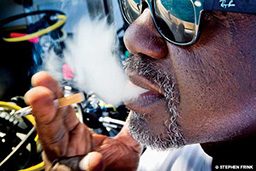Q: Is the sunscreen I put on before the boat ride to the dive site harmful to the marine environment?
A: First of all, kudos for protecting yourself from the sun. Sun protection is essential for skin-cancer prevention; about 65 percent of melanomas and 90 percent of nonmelanoma skin cancers are associated with exposure to ultraviolet (UV) radiation from the sun. Sunscreen is a vital part of a comprehensive sun-protection regimen that includes seeking shade, wearing a wide-brimmed hat and UV-blocking sunglasses, covering up with clothing and avoiding tanning booths.
Because of the vast quantity of water in the oceans, one might not suspect sunscreen would enter the marine environment in sufficient concentration to cause harm. However, the World Trade Organization estimates more than 60,000 tons of chemical sunscreen enter the ocean every year. Sunscreen can negatively impact not only visibility but marine life as well.
Consider that in swimming pools, professional photographers will note a marked difference in visibility when there are few people in the water versus many. The difference can be enough that shooting must be postponed due to the concentration of visibility-reducing contaminants. The sunscreen may be noticed by smell or in the form of a small oil slick on the surface.
Although there is much water in the ocean, we usually dive in specific, localized areas. These areas often teem with life: coral, fish, crustaceans and a plethora of microscopic organisms. Anything that enters the water has a tendency to traverse the whole water column from the surface to the bottom, coming in contact with everything in its path.
Ecologists have determined mainstream sunscreens share in the responsibility for the deterioration of many coral reefs. It is possible chemicals found in nonbiodegradable sunscreens may “awaken” dormant viruses present around corals. These viruses can replicate rapidly, killing the corals’ symbiotic algae and causing coral bleaching. Chemicals in nonbiodegradable sunscreens can remain intact and continue harming the environment for years. Some of the most popular ingredients in nonbiodegradable sunscreens are varieties of parabens, cinnamates and benzophenones, all of which have been shown to be destructive to the natural environment.
If you plan to lather up before diving, consider using a biodegradable sunscreen containing a mineral ingredient such as titanium oxide or zinc oxide. Of course, the zinc oxide or titanium oxide may also wash into the ocean from the wearer’s skin, but these are not known to have adverse environmental effects. Divers might also consider not wearing sunscreen before dives, choosing other methods of sun protection, and then using a biodegradable sunscreen after diving.
Q: I’m a smoker; what impact might this have on my ability to dive safely?
A: Smoking raises more concerns for divers than you might suspect. First of all, it causes a reduction in the lungs’ ability to ventilate, which can reduce arterial oxygenation and, consequently, exercise tolerance. Reduced exercise tolerance may mean impaired ability to fight a current or rescue yourself or another diver.

Smokers also have a higher incidence of lung damage as well as acute and chronic respiratory tract infections, all of which can limit exercise tolerance and, as a result, safe diving. This risk may be better understood through early identification using spirometry (a type of pulmonary-function testing) and may be reduced with regular aerobic exercise and by stopping smoking.
Smoking causes increased mucus production throughout the respiratory tract — from the nasopharynx to the bronchial tree. This mucus can block the Eustachian tubes, complicating or preventing equalization of the middle ears. This risk may be reduced by improved middle-ear-equalization techniques and, again, stopping smoking. Mucus plugs may also cause localized air trapping in the lungs. Should compressed gas become trapped in the lung during ascent, its expansion could cause pulmonary barotrauma (lung overexpansion injury), a severe injury that can lead to arterial gas embolism (AGE) or other complications. This risk may be reduced by always ascending slowly (30 feet per minute or slower) and (say it with us) stopping smoking.
Smoking is also known to be a significant risk factor for coronary artery disease. Divers who smoke should consider the risk of undetected coronary artery disease causing sudden angina of effort (pain with stress or exercise due to insufficient oxygenation of the heart muscle) during diving, especially if the diver has other risk factors for cardiac disease. This risk may be reduced through early identification by having a cardiac stress test and (one more time!) by stopping smoking.
With regard to decompression illness, a 2004 study revealed heavy smokers tended to develop more severe symptoms of DCI than lighter smokers, who in turn developed more severe symptoms than nonsmokers. When heavy smokers were compared to nonsmokers, the heavy smokers who manifested DCI were almost twice as likely to have severe symptoms as mild symptoms. The study did not prove that smoking predisposed divers to DCI, but it showed that if a diver develops DCI the severity tends to be greater in smokers.
Q: Why do I get GERD symptoms when I dive and not any other time?
A: Gastroesophageal reflux disease (GERD) is a condition in which stomach contents (food or liquid) leak backward from the stomach into the esophagus, the tube that connects the mouth to the stomach. This can irritate the esophagus and result in burning sensations, chest discomfort, bad breath and cough. GERD affects approximately 30 million Americans and is a significant source of physical discomfort.

Once food enters the stomach, a ring of muscle fibers prevents it from moving back into the esophagus. These fibers are known as the cardiac sphincter and, when functioning properly, form a one-way valve. If this sphincter doesn’t close well, food, liquid and stomach acid can leak back into the esophagus. Reflux can be sufficiently severe to even damage the esophagus. Heartburn and gastroesophageal reflux symptoms can be brought on or made worse by pregnancy, obesity, overeating and certain medical conditions as well as ingestion of coffee, citrus, chocolate, tomato products and some medications (aspirin and ibuprofen are two common examples).
Divers may experience symptoms of GERD as a result of a tight-fitting weight belt, BCD or wetsuit. Furthermore, unusual positions in which divers may find themselves, especially head-down positions, may exacerbate the symptoms.
Many people experience occasional mild heartburn, but if reflux occurs while diving a diver could be at significant risk of injury due to regurgitation or vomiting. Aspirating food or acid into the lungs or regulator could result in a dive accident.
If you experience regular or serious reflux symptoms, be sure to seek medical advice before diving. If you experience symptoms of GERD after diving, check with your primary care physician to rule out more serious issues before diving again.
— Lucie Gijzen, M.D., and Sam Gerson, M.D.
Q: If I’m having an emergency, can I email DAN instead of calling the hotline?
A: The DAN Medical Information department receives more than 3,500 email inquiries every year. In 2011 we responded to the largest volume of emails in our history, and though it is early, at our current rate we will exceed that number in 2012. Keep your questions coming!
The majority of the emails we receive relate to questions about medical fitness to dive. On rare occasions, we receive emergency emails — emails in which the writer is seeking an immediate response or is reporting postdive symptoms. While it is our intention to provide a prompt response to all emails, it may take a day or more, so if quick action is required, email is not a good way to go. If you need immediate help, the best way to contact us is by calling the DAN Emergency Hotline (+1-919-684-9111), which is staffed 24 hours a day, 365 days a year. The DAN Medical Information Line (+1-919-684-2948) is available during business hours for your nonemergency medical questions.
If symptoms develop following a dive, seek immediate medical attention or call 911 (or the local number for emergency medical services), and then call DAN. If your treating physician has questions about diving medicine or the possible association between your symptoms and recent diving, DAN is here as a resource. Thank you for your calls and emails — we appreciate the opportunity to address your concerns and enhance dive safety.
© Alert Diver — Q2 Spring 2012